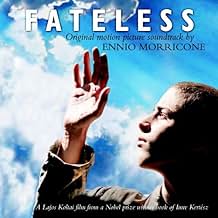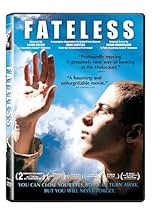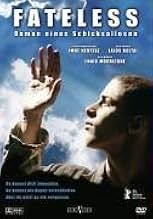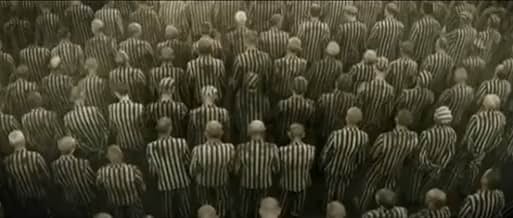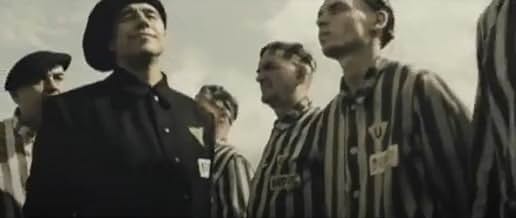Ajouter une intrigue dans votre langue14-year-old György's life is torn apart in WWII Hungary, as he is deported first to Auschwitz and then to Buchenwald, where he is forced to become a man in the midst of hatred, and what it r... Tout lire14-year-old György's life is torn apart in WWII Hungary, as he is deported first to Auschwitz and then to Buchenwald, where he is forced to become a man in the midst of hatred, and what it really means to be Jewish.14-year-old György's life is torn apart in WWII Hungary, as he is deported first to Auschwitz and then to Buchenwald, where he is forced to become a man in the midst of hatred, and what it really means to be Jewish.
- Récompenses
- 6 victoires et 7 nominations au total
- Moskovics
- (as Dani Szabó)
Avis à la une
Marcell Nagy is outstanding as Gyuri, the young man who moves from a childlike innocence to world-weariness in the span of one year. With his soulful face and expressive eyes, he is almost a detached observer, quietly pondering his fate. He is, in the Sufi saying, in the world, but not of it and the film unfolds as in a lucid dream that blurs the lines between appearance and reality. Koltai captures this almost matter-of-fact quality as Gyuri says goodbye to his father (Janos Ban) who has been ordered to work in a Nazi labor camp. Because Hungarians did not feel the full brunt of Nazi persecution until the Nazi takeover in 1944, Gyuri thinks his father is just going to have to work hard and that nothing will happen to him. Neighbors and relatives who reassure him that everything will be all right do not further his grasp of reality.
When the boy and his friends are detained on a bus on the way to work, he learns quickly that "his carefree childhood days are now over". Still not comprehending the magnitude of what is taking place, he is annoyed but not frightened and does not seize the opportunity to escape offered by a friendly cop. Even when he arrives at Auschwitz, he sits on the ground shaven and wearing a striped uniform, talking with friends as if he was in a school playground during recess. When Gyuri discovers that "he could be killed at any time, anywhere", he attains a sort of spiritual freedom and his determination to survive is increased. Pretending to be sixteen, Gyuri escapes the gas chamber and is sent to Buchenwald and then to a smaller camp.
The scenes of murder, death, and dying at the camps are thankfully left to the imagination and the film focuses on Gyuri's personal reactions to what he sees around him. Koltai, a cinematographer for twenty-five years, creates a visual cinematic poem in which his color palette is so muted that we experience the mud and the atmosphere of cold and gray almost viscerally. Sadly, we watch Gyuri's transformation from the confident teenager we saw at the beginning to an emaciated number, his leg so swollen and infected that he can barely walk. In voice-over, however, he talks about the hours between work and the evening meal as one of quiet reflection and about the joy in discovering a piece of meat or potato in his soup. He is also sustained by a friend he develops in fellow Hungarian Bandi Citrom (Aron Dimeny) who protects him and tries to teach him the skills of survival. Bandi, ever the optimist, proclaims, "I will walk down Nefelejcs Street again" One of the surprises in the film is the treatment Gyuri receives at what looks like a camp hospital.
He is cleaned, allowed to sleep alone in a bed and taken care of, a set of circumstances not usually associated with extermination camps, yet based on Kertesz' actual experience. The most discussed aspect of the film, however, takes place in Budapest after the liberation. Gyuri feels more alone than he did at Buchenwald and even expresses a sort of homesickness for the camaraderie he felt at the camp. Friends and neighbors who were not in the camps cannot understand what it was truly like and Gyuri cannot explain it. Even if he could, no one really wants to hear anything that rattles their preconceptions.
He rebels at playing the role of the victim and says, "there is nothing too unimaginable to endure". When asked about the atrocities, he talks of his happiness. "The next time I am asked", he says, "I ought to speak about that, the happiness of the concentration camp. If indeed I am asked. And provided I myself don't forget". His "happiness", according to Kertesz, who also wrote the screenplay, is not a form of denial but an act of rebellion against those who do not see him any longer as a human being, only as a victim. It was a way of assuring his responsibility, of defining his own fate rather than having others decide it for him. For me, it also added a portal into the sublime.
The film is long but very compelling and speaks loudly about man's inhumanity to his fellow man. The message is even more disturbing when told through the eyes of a young teenager who is caught up in the atrocities of the Nazis and their Hungarian allies.
If this film were in English or directed by Steven Spielberg, it would no doubt win numerous awards. Let us hope that "Fateless" is recognized for it's bravery and excellence.
There are weaknesses too, of course, some dialogues, mainly in the beginning of the film are not natural (maybe it comes from Kertész's newness in film-writing), it' very disturbing as some weak acting in a few episodes. Marcell Nagy is not a bad choice for the leading role, he has the look and the power in his eyes but in speech he's not convincing, it drops you out of the atmosphere sometimes but it won't bother the not-Hungarian audience.
'Fateless' is an impressive European masterpiece, Hungary should be proud of it.
Le saviez-vous
- AnecdotesThe production unexpectedly ran out of money halfway through and halted for several months in order to find new investors. This ended up working in its favor, since Marcell Nagy was going through puberty, and by the time they restarted, he looked physically more mature, taller, and his voice deeper. By the time his character enters and survives the death camp, he looks several years older than when the film began, adding an element of reality that otherwise would have been created with make-up.
- Citations
[last lines]
György Köves: [narrating] People only ask about the horrors, whereas I should talk about the happiness of the camps next time, if they ask. If they ask at all. And if I don't forget myself.
- Crédits fousFlash v. Schwabenland, Production Dog
- Bandes originalesHoldvilágos éjszakán (On a Moonlit Night)
Music by Mihály Eisemann
Lyrics by István Zágon
Sung by the four boys when the group is in transit
Meilleurs choix
- How long is Fateless?Alimenté par Alexa
Détails
- Date de sortie
- Pays d’origine
- Sites officiels
- Langues
- Aussi connu sous le nom de
- Fateless
- Lieux de tournage
- Sociétés de production
- Voir plus de crédits d'entreprise sur IMDbPro
Box-office
- Budget
- 2 500 000 000 HUF (estimé)
- Montant brut aux États-Unis et au Canada
- 196 857 $US
- Week-end de sortie aux États-Unis et au Canada
- 12 680 $US
- 8 janv. 2006
- Montant brut mondial
- 2 512 009 $US
- Durée
- 2h 20min(140 min)
- Couleur
- Mixage
- Rapport de forme
- 2.35 : 1





